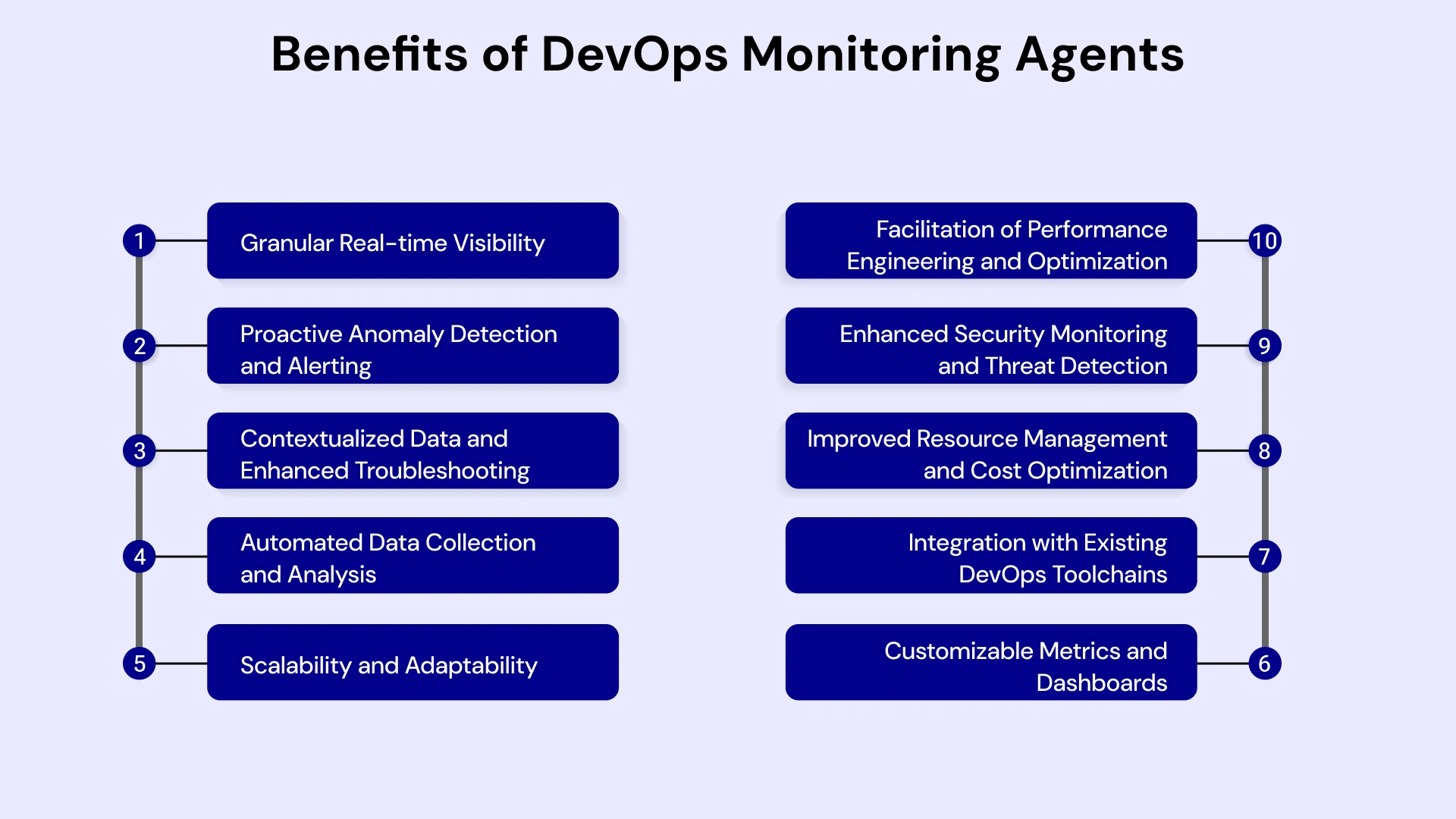This harsh reality necessitates a paradigm shift towards proactive system management, and at its core lies the indispensable DevOps Monitoring Agent.
These unsung heroes of IT infrastructure empower organizations to achieve a remarkable feat: a 45% reduction in downtime. They accomplish this by providing an unparalleled level of real-time visibility, enabling lightning-fast incident response, and harnessing the power of predictive analytics to foresee and prevent potential disruptions.
This comprehensive blog post will delve deep into the world of DevOps monitoring agents, exploring their essence, illustrating their practical applications, and illuminating their pivotal role in maintaining system resilience.
Let’s start!
What is a DevOps Monitoring Agent?
At its core, a DevOps monitoring agent is a specialized software component meticulously designed to perform a crucial function: the continuous collection, meticulous analysis, and timely reporting of critical data emanating from your applications, underlying infrastructure, and interconnected networks.
These agents operate in real time as vigilant sentinels, diligently gathering performance metrics, logs, and traces. Their true power, however, lies in their seamless integration with sophisticated DevOps monitoring tools.
This synergy transforms raw data into actionable intelligence, providing invaluable insights that proactively empower teams to manage their systems and ensure uninterrupted operation. The importance of DevOps monitoring cannot be overstated, and these agents are the primary conduits through which this vital function is executed.
Examples of DevOps Monitoring Agents
The landscape of DevOps monitoring agents is diverse, with various DevOps tools catering to specific needs and environments. Here are some prominent examples:

- Prometheus Agent: A cornerstone of open-source monitoring, the Prometheus agent excels at collecting metrics from various sources and providing robust alerting capabilities. Its tight integration with containerized environments like Kubernetes makes it a favorite among cloud-native adopters.
- Datadog Agent: This powerful cloud-based monitoring solution boasts an agent that seamlessly gathers data across the entire technology stack. The standout features of the DevOps monitoring agent include AI-driven anomaly detection, which provides proactive insights into potential issues.
- New Relic Infrastructure Agent: Offering comprehensive full-stack observability, the New Relic Infrastructure agent provides deep visibility into the performance and health of both applications and the underlying server infrastructure. This holistic view is invaluable for troubleshooting and optimization.
- Sensu by Sumo Logic: Known for its lightweight design and real-time monitoring capabilities, the Sensu agent is adept at event processing and facilitating rapid incident response. Its flexibility makes it suitable for various environments, including hybrid deployments.
- Zabbix Agent: An enterprise-grade monitoring solution, the Zabbix agent offers extensive capabilities for monitoring networks, servers, applications, and services. Its scalability and robust feature set make it a popular choice for large organizations.
These diverse examples of DevOps monitoring agents underscore their critical role in enabling DevOps consulting companies and internal IT teams to maintain optimal system health, swiftly detect anomalies, and proactively prevent costly outages. These agents' effective deployment and management are often a key focus of DevOps Consulting Services.
Importance of DevOps Monitoring
The importance of DevOps monitoring extends far beyond simply identifying when something breaks. It's about cultivating a proactive management culture, continuous improvement, and data-driven decision-making across the entire software development and operations lifecycle. Effective monitoring, powered by robust agents, provides a critical feedback loop that fuels agility, resilience, and innovation.
Why DevOps Monitoring Matters?
- Prevents Costly Outages and Minimizes Business Impact: Beyond the immediate financial hit, downtime erodes customer trust, damages brand reputation, disrupts critical business processes, and can even lead to regulatory penalties. Robust DevOps monitoring acts as an insurance policy, minimizing the frequency and duration of outages, thereby safeguarding the entire business ecosystem.
- Enhances Performance and Optimizes Resource Utilization: Real-time visibility into system performance allows teams to identify bottlenecks, optimize resource allocation (CPU, memory, network), and ensure applications run efficiently. This not only improves user experience but also reduces unnecessary infrastructure costs.
- Improves MTTR (Mean Time to Resolution) and Accelerates Recovery: Proactive monitoring significantly reduces the time it takes to restore services after an incident by providing detailed diagnostic information and facilitating faster root cause analysis. This minimizes disruption and ensures business continuity.
- Facilitates Proactive Problem Management and Prevents Recurring Issues: Monitoring data can reveal recurring patterns and underlying systemic issues that might not trigger immediate outages but degrade performance over time. Addressing these proactively prevents future incidents and improves overall system stability.
- Supports Data-Driven Decision Making and Continuous Improvement: The wealth of data collected through monitoring provides valuable insights into system behavior, application performance, and user interactions. This data can inform capacity planning, architectural improvements, and optimizing development and deployment processes.
- Increases Team Collaboration and Accountability: Shared visibility into system health fosters better communication and collaboration between development and operations teams. It creates a shared sense of ownership and accountability for the reliability and performance of the entire system.
- Enables Faster Innovation and Feature Releases: A stable and well-monitored environment reduces the risk associated with new deployments. This allows development teams to iterate faster, release new features more frequently, and drive innovation without fear of destabilizing the production environment.
- Strengthens Security Posture through Continuous Vigilance: Integrating security monitoring into the DevOps pipeline (DevSecOps) allows for continuous detection of security threats and vulnerabilities. This proactive approach strengthens the overall security posture and reduces the risk of security-related incidents.
- Improves Customer Satisfaction and Loyalty: Reliable and performant applications lead to happier customers. By minimizing downtime and ensuring a positive user experience, effective DevOps monitoring directly contributes to increased customer satisfaction and loyalty.
- Provides Compliance and Audit Trails: Comprehensive monitoring and logging provide the necessary audit trails for compliance with various regulatory requirements, simplifying audits and demonstrating adherence to industry standards.
Key Benefits of DevOps Monitoring Agents
The deployment of DevOps monitoring agents unlocks a multitude of tangible benefits:

- Granular Real-time Visibility: Monitoring agents provide detailed, real-time insights into the performance and health of individual components, applications, and infrastructure elements. This granular visibility is crucial for identifying the precise source of issues.
- Proactive Anomaly Detection and Alerting: Advanced agents leverage machine learning to establish baselines and detect deviations from normal behavior, proactively alerting teams to potential problems before they impact users. This early warning system is invaluable for preventing outages.
- Contextualized Data and Enhanced Troubleshooting: Agents collect a wide range of data, including metrics, logs, and traces, and often correlate this information to provide a contextualized view of system behavior. This significantly simplifies troubleshooting and accelerates root cause analysis.
- Automated Data Collection and Analysis: Monitoring agents automate the tedious data collection and initial analysis, freeing up valuable time for DevOps teams to focus on more strategic tasks like problem resolution and system optimization.
- Scalability and Adaptability to Dynamic Environments: Modern monitoring agents are designed to scale seamlessly with dynamic environments, such as cloud-native architectures and containerized deployments. They can automatically discover and monitor new resources as they are provisioned.
- Customizable Metrics and Dashboards: Most monitoring tools allow for configuring custom metrics and creating tailored dashboards that provide a focused view of the data most relevant to specific teams and applications.
- Integration with Existing DevOps Toolchains: Effective monitoring agents integrate seamlessly with other tools in the DevOps ecosystem, such as CI/CD pipelines, alerting systems, and incident management platforms, creating a cohesive and automated workflow.
- Improved Resource Management and Cost Optimization: By providing insights into resource utilization, agents help identify underutilized or over-provisioned resources, enabling teams to optimize infrastructure spending and improve efficiency.
- Enhanced Security Monitoring and Threat Detection: Agents can collect security-related logs and metrics, providing valuable data for security analysis and threat detection within a DevSecOps framework. This continuous security monitoring is crucial for protecting against cyber threats.
- Facilitation of Performance Engineering and Optimization: The detailed performance data collected by agents enables performance engineers to identify bottlenecks, optimize code, and fine-tune system configurations for maximum efficiency and responsiveness.
DevOps Monitoring: Your 45% Downtime Shield
The claim that DevOps monitoring agents reduce downtime by 45% is substantiated by their ability to address potential issues at various stages proactively. Here's a breakdown of the ten keyways they achieve this significant reduction:

1. Early Detection of Failures
DevOps monitoring agents continuously scrutinize system metrics, detecting anomalies like unusual CPU spikes or memory leaks long before they manifest as service-impacting outages. This early detection reduces MTTD (Mean Time to Detection), often by as much as 85%, allowing teams to intervene proactively.
2. Faster Incident Resolution
When incidents occur, the rich diagnostic data provided by monitoring agents, coupled with automated RCA capabilities, empowers teams to pinpoint the root cause swiftly and implement effective fixes. This leads to a remarkable 51% reduction in incident resolution times.
3. Predictive Maintenance
Leveraging AI-driven analytics, sophisticated monitoring agents can forecast potential failures based on historical trends and emerging patterns. This predictive capability enables proactive maintenance and patching, preventing crashes before they happen.
4. Improved CI/CD Pipeline Stability
By integrating with CI/CD pipelines, monitoring agents can detect deployment errors and performance regressions early in the release cycle. This early feedback loop reduces the occurrence of failed releases by as much as 96%, ensuring a more stable and reliable deployment process.
5. Enhanced Observability
DevOps monitoring tools, powered by comprehensive agents, provide unified visibility across the entire technology stack. This eliminates blind spots and empowers teams with a holistic understanding of system behavior, which is crucial for effectively identifying and resolving issues. These enhanced observability tools in the DevOps landscape are critical for modern applications.
6. Automated Scaling
Monitoring agents can trigger auto-scaling mechanisms in cloud environments based on real-time resource utilization. This prevents overloads during peak traffic periods, ensuring consistent performance and preventing downtime due to resource exhaustion.
7. Security Threat Detection
Integrated DevSecOps tools, often with monitoring agents, can detect and block security vulnerabilities in real time. This proactive security posture minimizes the risk of security-related outages and data breaches. Understanding what DevSecOps is crucial in this context.
8. Reduced False Alerts
Advanced monitoring agents utilize AI-powered filtering to minimize noise and reduce the number of false alerts. This ensures that teams focus their attention on critical issues, improving efficiency and reducing alert fatigue.
9. Optimized Resource Usage
Agents can identify underutilized resources by continuously monitoring resource utilization. This provides valuable insights into cost optimization and efficient capacity planning, which indirectly contributes to system stability by ensuring resources are appropriately allocated.
10. Compliance & Audit Support
Monitoring agents automate the collection and logging of critical data, ensuring adherence to various regulatory compliance standards such as GDPR, HIPAA, and SOC2. This automated logging simplifies audits and reduces the risk of compliance-related disruptions.
Features of DevOps Monitoring Agents
A truly effective DevOps monitoring agent is equipped with a comprehensive suite of features of DevOps monitoring agent designed to provide deep insights and facilitate proactive management:
- Automated Log Collection: These agents seamlessly aggregate logs from various sources, centralizing this critical data for faster debugging and analysis. Efficient log management is a cornerstone of effective monitoring.
- Performance Metrics Tracking: They meticulously track key performance indicators (KPIs) such as CPU utilization, memory consumption, network latency, and disk I/O. This granular data provides a real-time snapshot of system health and performance.
- Distributed Tracing: In complex microservices architectures, distributed tracing capabilities allow agents to track requests as they traverse various services. This is invaluable for identifying performance bottlenecks and understanding the flow of transactions.
- AI-Powered Anomaly Detection: Advanced agents leverage AI algorithms to identify unusual patterns and deviations from normal behavior. This proactive anomaly detection can flag potential issues before they impact users.
- Integration with CI/CD Pipelines: Seamless integration with Continuous Integration/Continuous Delivery (CI/CD) pipelines ensures monitoring is an integral part of the software development lifecycle, allowing for early detection of deployment-related issues. This is a key aspect often addressed by a DevOps consulting company.
These sophisticated features make DevOps monitoring agents indispensable tools for organizations leveraging cloud consulting services and those prioritizing robust cybersecurity consulting company practices.
Functions of DevOps Monitoring Agents
The core functions of DevOps Monitoring Agents revolve around the continuous collection, analysis, and dissemination of critical system data. These functions can be broken down as follows:
- Real-time Data Collection: The primary function is continuously gathering various metrics from servers, containers, applications, databases, and other infrastructure components. This real-time data stream forms the foundation for effective monitoring.
- Automated Alerting: When predefined thresholds are breached or anomalies are detected, monitoring agents trigger automated alerts, notifying relevant teams via various channels such as Slack, email, or SMS. Timely alerts are crucial for rapid incident response.
- Incident Correlation: Advanced agents can correlate related events and data points to help pinpoint the underlying root causes of incidents. This intelligent correlation significantly accelerates the troubleshooting process.
- Performance Benchmarking: By continuously collecting historical data, agents enable performance benchmarking, allowing teams to compare current performance against past trends and identify potential regressions or areas for optimization.
- Security Compliance Checks: In the context of DevSecOps, monitoring agents can be configured to enforce security policies and flag potential vulnerabilities in real time, contributing to a more secure and compliant environment.
Understanding these key functions of DevOps Monitoring Agents highlights their multifaceted role in maintaining system stability and security.
Top DevOps Monitoring Tools
The selection of the right DevOps monitoring tools is crucial for maximizing the benefits of monitoring agents. Here are some leading tools in the market:
| Category | Tool Name | Key Features |
| Open-Source Tools | Prometheus | Time-series database with powerful querying (PromQL) and alerting. |
| Grafana | Visualization platform for metrics, logs, and traces (often paired with Prometheus). | |
| Zabbix | Enterprise-grade monitoring for networks, servers, and cloud services. | |
| Nagios | Legacy tool for infrastructure and service monitoring. | |
| Elastic Stack (ELK) | Log analysis with Elasticsearch, Logstash, and Kibana. | |
| Sensu | Lightweight agent for cloud-native and hybrid environments. | |
| Commercial/Cloud-Native Tools | Datadog | Full-stack observability with APM, logs, and synthetic monitoring. |
| New Relic | AI-driven APM and infrastructure monitoring. | |
| Dynatrace | AI-powered root-cause analysis for cloud-native apps. | |
| Splunk | Machine-data analytics for security and operational insights. | |
| AppDynamics | Focused on CI/CD pipeline and application performance. | |
| Sumo Logic | Cloud-based log analytics and security monitoring. | |
| Specialized Tools | InfluxDB | Time-series database for high-velocity metrics. |
| ChaosSearch | Log analytics directly on cloud storage (AWS S3, Google Cloud). | |
| Kubecost | Cost monitoring for Kubernetes. | |
| Lightstep | Distributed tracing for microservices. | |
| OpenTelemetry | Vendor-neutral observability framework. | |
| Emerging Tools | Honeycomb | Debugging-focused observability with high-cardinality data. |
| SigNoz | Open-source alternative to Datadog with traces, metrics, and logs. | |
| Sematext | Unified monitoring for logs, metrics, and synthetic checks. |
When coupled with their respective DevOps monitoring agents, these tools provide a robust foundation for proactive system management and downtime reduction. The landscape of monitoring tools in DevOps is constantly evolving, with new and innovative solutions emerging regularly. Organizations also leverage various tools for continuous monitoring to ensure ongoing system health.
DevOps Monitoring Best Practices
To fully harness the power of DevOps monitoring agents and achieve significant downtime reduction, organizations should adhere to the following DevOps best practices:
- Adopt Full-Stack Observability: Implement monitoring across all layers of the technology stack, including applications, infrastructure, and networks, to gain a comprehensive understanding of system behavior.
- Implement AIOps: Leverage AI-powered tools and techniques to automate incident management, anomaly detection, and root cause analysis, enhancing efficiency and reducing response times.
- Standardize Logging: Ensure consistent log formats across all systems and applications to facilitate easier analysis and correlation of events.
- Set Up Automated Alerts: Define clear thresholds and configure automated alerts for critical metrics to ensure timely notification of potential issues.
- Conduct Regular Audits: Continuously review and optimize monitoring rules and configurations to ensure they remain relevant and practical in a dynamic environment.
Embracing these best practices will maximize the effectiveness of your DevOps monitoring strategy and the value derived from your monitoring agents.
Industry-Wise Use Cases of DevOps Monitoring Agents
The versatility of DevOps monitoring agents makes them invaluable across various industries and use cases:
- E-commerce: Monitoring agents ensure the smooth operation of eCommerce industry platforms, preventing checkout failures and maintaining a seamless customer experience during peak traffic periods like sales events.
- FinTech: In the highly regulated financial technology sector, continuous monitoring is critical for ensuring the reliability and security of transaction processing systems, maintaining compliance, and preventing service disruptions.
- Healthcare: Monitoring critical patient data systems in healthcare industries is paramount for ensuring data integrity, availability, and compliance with stringent regulations like HIPAA.
- Cloud Services: Cloud service providers rely heavily on monitoring agents to auto-scale resources based on demand, ensuring consistent performance and availability for their diverse customer base.
These examples of DevOps Monitoring Agents in action highlight their transformative impact on operational efficiency and service reliability across different domains.
Future of DevOps Monitoring Agents
The evolution of DevOps monitoring agents points towards:

- Smarter AIOps: Agents will feature enhanced AI/ML for autonomous anomaly detection, intelligent alerting, predictive capacity planning, and explainable RCA, leading to self-healing systems.
- Deeper SDLC Integration: Agents will be embedded earlier in the development lifecycle for pre-production monitoring, automated testing, and feature flag analysis.
- Broader Environment Coverage: Expect specialized agents for edge computing, serverless architectures, and potential integration with quantum computing.
- Enhanced Observability: Wider adoption of OpenTelemetry, improved synthetic monitoring, and privacy-preserving RUM will provide richer insights.
- Stronger Security (DevSecOps): Agents will offer real-time threat detection, compliance monitoring, and integration with vulnerability management.
- Cost Optimization (FinOps): Agents will provide granular cloud cost monitoring and integration with billing tools.
- Platform Engineering Support: Agents will be more self-service oriented with standardized metrics and dashboards for development teams.
In essence, future DevOps monitoring agents will be more intelligent, automated, integrated, and versatile, crucial for managing increasingly complex and distributed systems with greater reliability, security, and efficiency.
Choose VLink DevOps Services to Reduce Downtime
In pursuing digital resilience, VLink's DevOps Consulting Services offer a strategic partnership to significantly reduce downtime. We understand the critical importance of DevOps monitoring and the power of well-implemented DevOps monitoring agents. Our experts collaborate with you to assess your needs, develop a tailored monitoring strategy, and implement the right monitoring tools in DevOps seamlessly within your environment.
Our dedicated team focuses on integrating monitoring into your CI/CD pipelines, establishing proactive alerting, and embedding DevSecOps best practices for a secure and stable infrastructure. By choosing VLink, you gain a dedicated team committed to delivering tangible results, including a substantial reduction in downtime.
We go beyond mere tool deployment, focusing on building a proactive system that leverages DevOps monitoring agents to predict, prevent, and swiftly resolve issues. Our ongoing support ensures your monitoring strategy remains effective and evolves with your business. Partner with VLink to move beyond reactive firefighting and build a resilient, high-performing digital future.
Conclusion
DevOps monitoring agents have transcended the realm of optional tools; they are now an indispensable cornerstone of any modern, reliable digital infrastructure. Their proven ability to reduce downtime by a remarkable 45% translates directly into significant cost savings, enhanced system reliability, and improved customer satisfaction.
Whether you are a nimble startup or a large enterprise, strategically partnering with a reputable DevOps consulting company or leveraging the expertise of cybersecurity consulting services providers can ensure the seamless implementation and optimal utilization of these critical monitoring tools.
Unlock your infrastructure's full potential with our comprehensive DevOps consulting services and innovative AI agent software development solutions. Contact us now. Our expert team is ready to guide you on your journey towards enhanced system reliability and operational excellence.










 Shivisha Patel
Shivisha Patel

















